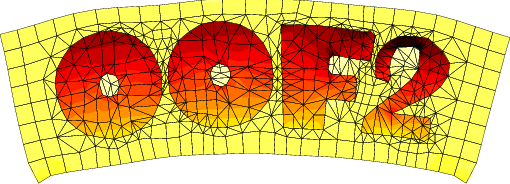OOF: Finite Element Analysis of Microstructures
OOFCanvas

|
|
|
[Introduction] |
|
| Introduction |
OOFCanvas is a replacement for libgnomecanvas, designed for use in OOF2, but hopefully useful elsewhere. OOFCanvas is based on Cairo and is compatible with gtk3. OOF2 used libgnomecanvas to display and interact with images and meshes. But libgnomecanvas requires gtk+2, and gtk+2 works only with Python3, not Python2, and Python2 is being phased out. In order to upgrade OOF2 to Python3, we needed to first upgrade it from gtk+2 to Gtk3, and to do that we needed to first replace libgnomecanvas. The canvas is a drawing area that can display a variety of shapes, including text. It can be scrolled, zoomed, and printed. Items drawn on the canvas can be selected with the mouse. OOFCanvas is not a drop-in replacement for libgnomecanvas. It's also not a full-fledged gtk widget. It's a set of classes that does some of what libgnomecanvas did and uses gtk. All of the code is in C++. Wrappers for Python are generated by SWIG. |
| Download and Install |
|
| Documentation |
See the OOFCanvas Manual and the OOFCanvas Change Log. |
| Disclaimer |
NIST-developed software is provided by NIST as a public service. You may use, copy and distribute copies of the software in any medium, provided that you keep intact this entire notice. You may improve, modify and create derivative works of the software or any portion of the software, and you may copy and distribute such modifications or works. Modified works should carry a notice stating that you changed the software and should note the date and nature of any such change. Please explicitly acknowledge the National Institute of Standards and Technology as the source of the software. To facilitate maintenance we ask that before distributing modified versions of this software, you first contact the authors at [email protected]. NIST-developed software is expressly provided "AS IS." NIST MAKES NO WARRANTY OF ANY KIND, EXPRESS, IMPLIED, IN FACT OR ARISING BY OPERATION OF LAW, INCLUDING, WITHOUT LIMITATION, THE IMPLIED WARRANTY OF MERCHANTABILITY, FITNESS FOR A PARTICULAR PURPOSE, NON-INFRINGEMENT AND DATA ACCURACY. NIST NEITHER REPRESENTS NOR WARRANTS THAT THE OPERATION OF THE SOFTWARE WILL BE UNINTERRUPTED OR ERROR-FREE, OR THAT ANY DEFECTS WILL BE CORRECTED. NIST DOES NOT WARRANT OR MAKE ANY REPRESENTATIONS REGARDING THE USE OF THE SOFTWARE OR THE RESULTS THEREOF, INCLUDING BUT NOT LIMITED TO THE CORRECTNESS, ACCURACY, RELIABILITY, OR USEFULNESS OF THE SOFTWARE. You are solely responsible for determining the appropriateness of using and distributing the software and you assume all risks associated with its use, including but not limited to the risks and costs of program errors, compliance with applicable laws, damage to or loss of data, programs or equipment, and the unavailability or interruption of operation. This software is not intended to be used in any situation where a failure could cause risk of injury or damage to property. The software developed by NIST employees is not subject to copyright protection within the United States. |